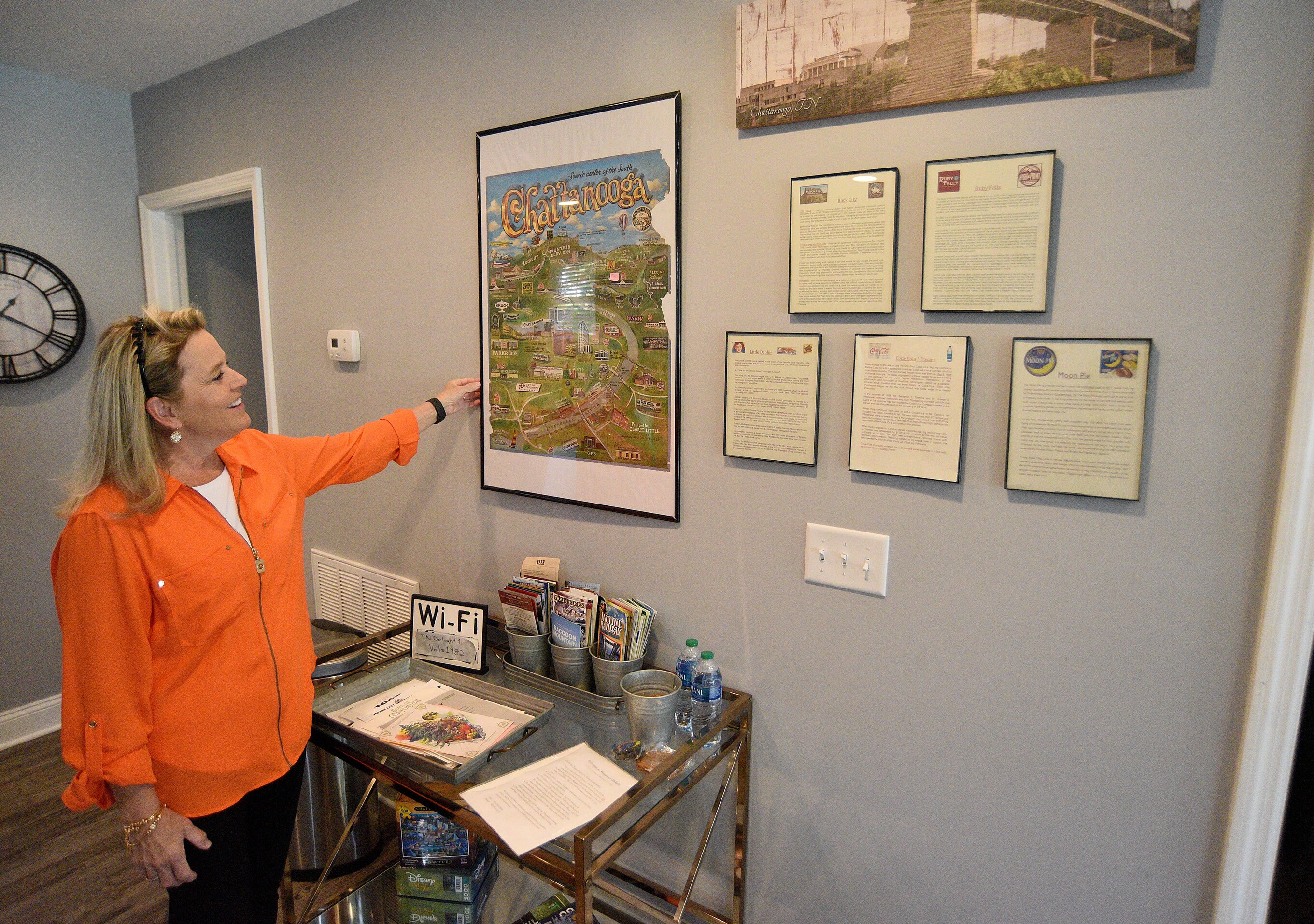After pausing new permits for certain properties in April to refine existing guidelines, the Chattanooga City Council on Tuesday will consider new rules for short-term vacation rentals that will include beefed up enforcement measures for illegal units.
Councilwoman Jenny Hill, of North Chattanooga, and Councilman Chip Henderson, of Lookout Valley, are co-sponsoring an ordinance that would increase the cost of new short-term rental certificates, set density requirements, impose stiffer financial penalties for illegally operated properties and create a designated citizen board that would hear appeals and moderate disputes.
The city put in place its moratorium on new nonowner-occupied, short-term vacation rentals last year to give officials time to work out new regulations.
"The original conversation about a moratorium began because the community was reaching a boiling point with the proliferation of (absentee) short-term vacation rental units," Hill said in a phone call Thursday. "When we saw that, we were as a council looking at a lot of appeals, and we just recognized the process wasn't working well. We wanted to give more clarity to everyone about what the expectations could be for a neighborhood and for an investor."
(READ MORE: Hamilton County commissioners extend short-term vacation rental pause to March 1)
The full council will consider the changes at 4 p.m. Tuesday at the Chattanooga City Council Building, 1000 Lindsay St. The council is meeting earlier than usual next week because of Valentine's Day.
The ordinance will require two votes of approval from the council before going into effect. It divides short-term rentals into two categories: Homestay rentals where the owner lives on the property and absentee rentals where the owner doesn't live on the property.
___
DOCUMENT
___
Under the proposed changes, application fees for homestay rentals would increase from $150 to $500. The cost of an annual renewal would be $250.
Setting up an absentee rental would be more expensive. Along with a nonrefundable $500 application fee, property owners who receive approval would pay $750 for a certificate, of which $250 would flow directly to the city's affordable housing fund. The annual cost to renew a certificate for an absentee rental would also be $750. Likewise, $250 of that amount would go into the affordable housing fund.
"We have a housing shortage in Chattanooga, and every place where a person can live is an important part of our overall housing ecosystem," Hill said. "When we take a unit out of the housing stock and turn it into lodging stock, it has an effect on how many units are available for full-time Chattanooga residents to live in them."
(READ MORE: Property owners await Chattanooga's decision on short-term vacation rentals)
City officials set aside $33 million in the current fiscal year budget to create a dedicated fund to support affordable housing projects in Chattanooga. Leaders hope to grow that to $100 million, and Hill hopes the extra money raised through absentee permits and renewals will help offset the impact of short-term rentals on the region's available affordable housing inventory. The higher fees will also help cover the cost of new enforcement measures.
The ordinance creates the opportunity for applicants to transfer their certificates between owners, which hasn't previously been possible. A dedicated short-term vacation rental board would review those requests. Transfers would cost $1,000, with all of that money being diverted to the affordable housing fund.
Additionally, absentee rentals already have a more rigorous approval process. Under existing rules posted on the city website, applications that receive four or more objections from neighbors within 300 feet of the property proceed to the City Council for a public hearing. Properties denied by the council are restricted from operating a rental for one year.
The new ordinance would make evaluating those objections the responsibility of the short-term vacation rental board. If a property receives letters of concern from four neighbors within 500 feet of the property, it triggers a review by the new panel.
The short-term vacation rental board will consist of nine members who would have to meet certain qualifications. The mayor would appoint five members and the council four. They would sit for two-year terms.
As a means of cutting down on density, no more than 5% of units in a multi-family dwelling could be reserved for absentee short-term vacation rentals, and no new absentee permits would be allowed within 500 feet of another vacation rental in a single-family detached zoning district.
The city is also introducing a stronger financial deterrent for property owners who fail to receive proper approvals. The City Council would appoint an administrative hearing officer who will be able to charge owners a fine of $500 per day per violation, an increase over the current maximum of $50 per day.
Since implementing new compliance software through a company called Granicus, Chris Anderson, Mayor Tim Kelly's senior adviser for legislative initiatives, said in a phone call that the city has seen a consistent decline in the number of illegal short-term rentals being advertised online, dropping from about 400 to about 200. The city sent out hundreds of letters to owners of unpermitted rentals last year.
As an additional measure, the city will be bringing on three new zoning inspectors to help enforce short-term vacation rental rules at an annual cost of about $350,000.
"This would empower the city to have enough staff to actually send people out and verify short-term vacation rentals in the field, which we've never had the staff to do before," Anderson said.
Henderson said by phone that he hopes the changes allay concerns among neighbors that their communities will be overrun by vacation rentals. He also hopes they result in a neutral effect on the city's affordable housing stock.
Through this process, the city is also acknowledging a generational shift in the way people travel, Henderson said, with more tourists relying on short-term rental properties rather than hotels.
"I think we need to hopefully strike a balance between housing stock and affordability but also address our tourism needs," Henderson said, pointing out that Forbes recently listed Chattanooga as one of the best places to travel in 2023.
Asked for her thoughts about the proposed rule changes, Donna Morgan, a short-term vacation rental owner and manager in Chattanooga, said in a phone call Friday that she has concerns about the city denying renewals for existing rentals based on the new density rules.
Hill said that provision is not included in the current ordinance. An earlier version would have opened the door to that possibility, Hill said, but officials have removed it because it wasn't in accordance with state law.
"(This ordinance) won't close any existing, legal vacation rentals," Hill said.
Contact David Floyd at dfloyd@timesfreepress.com or 423-757-6249.


